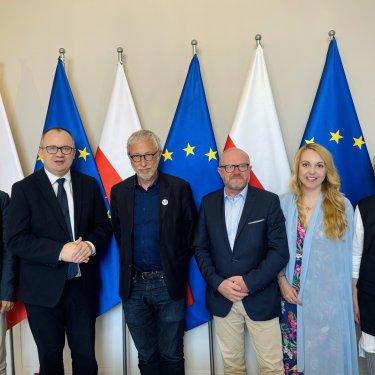Poland: promising start as new government meets with RSF about the right to information

Poland’s recent political change is an opportunity to strengthen the right to reliable information both domestically and Europe-wide. Reporters Without Borders (RSF) was heartened by their meetings with the new government, who showed interest in RSF’s solutions and recommendations.
From 8 July to 11 July 2024, RSF held discussions with Polish media and government officials in the capital, Warsaw, about protecting press freedom and fighting against propaganda, disinformation and malicious foreign interference – namely from Russia – in the information space.
The meetings came at a remarkable moment, opening an extraordinary window for action: the replacement of the parliamentary majority of the Law and Justice party by Prime Minister Donald Tusk’s government after the October 2023 general election; the recomposition of the European Parliament and European Commission after the June 2024 European elections, and the upcoming Polish EU Council Presidency (January - June 2025).
"The change of government is not only an opportunity for press freedom in Poland, but also the whole of Europe. We have started a promising dialogue with key ministers in the hopes of fostering a proactive Polish EU Presidency. We are looking forward to concrete cooperation on RSF’s proposals, which could significantly contribute to ending the law of the jungle still ruling the information space.
It is clear from the conversations that RSF held with Polish media in Warsaw that the political grip on their work has significantly loosened following the Law and Justice party’s departure from power. The hope sparked by the arrival of Prime Minister Donald Tusk and his cabinet at the end of 2023 has already been fed as Poland rose by 10 places in RSF’s 2024 World Press Freedom Index. The country now holds 47th place out of 180.
Major challenges at home and abroad
Still, the new government has yet to address major challenges for press freedom at home: the depoliticization of the public media, the protection of journalists against vexatious lawsuits (SLAPPs), and reporters’ ability to freely and independently cover sensitive issues, such as the law enforcement operation on the border with Belarus. What’s more, the right to trustworthy information in Poland — like elsewhere in Europe — is increasingly undermined by online platforms, generative artificial intelligence (AI) and malicious foreign interference.
"During the Polish EU Council Presidency starting in six months, we will promote an effective European action against vexatious lawsuits (SLAPPs) and malicious Russian interference in the information space. Our action will be inspired by our domestic experience and will be open to inspiration by proposals of RSF.
In addition to addressing gag lawsuits and Russia’s information war, the joint working session between RSF, Minister of Justice Adam Bodnar and Undersecretary of State at the Ministry of the Interior and Administration Maciej Duszczyk discussed regulations limiting journalists access to the border with Belarus as well as the fragile safety of Polish journalists. RSF also covered measures to strengthen the independence of Polish public media — in compliance with RSF’s earlier proposals for the country – with the Undesecretary of State at the Ministry of Culture Marta Cienkowska.
Stronger European cooperation
In line with its recommendations for the EU, RSF asked Polish government officials to leverage Poland’s upcoming EU Presidency to promote stronger European coordination in support of exiled journalists, the fight against cyber-harassment, and the undue surveillance of European reporters. Potential new solutions to circumvent Russia’s censorship and propaganda – such as RSF’s proposed system of protection, as well as their established satellite and Collateral Freedom projects – were raised by the NGO at its meetings with Adam Szłapka, Minister of European Affairs, who is in charge of preparing Poland’s six-month chairmanship of the EU Council; with Dariusz Standerski, Undersecretary at the Ministry of Digitalisation; and with Tomasz Chłoń, Plenipotentiary for Countering International Disinformation.
RSF will follow up with the Polish media and government officials to translate Poland’s commitment to stronger press freedom, both at home and abroad, into concrete action.
